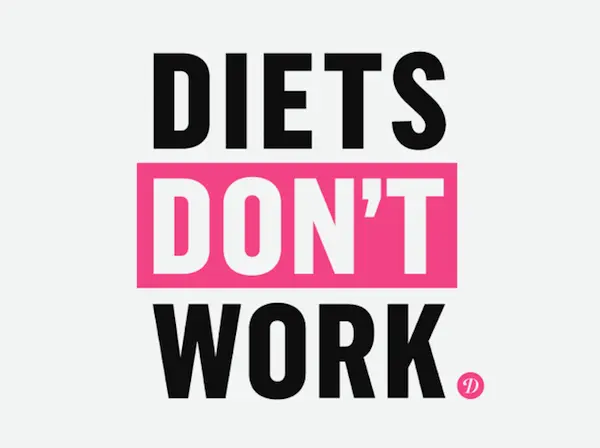You’d think that with so many different types of diets out there, there’s bound to be one that works, right? Well, not exactly. In fact, diets have a 95% failure rate. While many people experience the fast results that diets promise, they’re typically short lived. This is because dieting works against our body’s innate behaviors, biology, and psychology.
Diets screw with our survival instincts. Several diets out there put limitations on when, what, and how much we can eat. Instead of teaching us how to listen to our body and its needs, diets teach us to work against our body. While following a diet plan filled with restrictions and rules will initially give you promising weight loss results, it actually forces your body into survival mode. This is a huge stressor on the body and causes increased production of stress hormones. When your body produces higher levels of cortisol and adrenaline, this in turn slows down the rate at which calories are burned. This is because your body believes it is at risk of starvation and becomes concerned with limited energy needs, so it starts conserving calories, specifically in the form of fat. While you may see quick weight loss initially, it is actually slowing down your metabolism and putting you at greater risk of gaining all that weight (and more) back once your body is no longer feeling threatened.
Diets do not create sustainable habits. Diets are created to induce external changes that are reasonable for a month or two, but what about for a lifetime? Of course, what we choose to eat is important, but building a balanced diet goes deeper. To create sustainable dietary habits, we must get in touch with our deep-rooted beliefs, patterns, and behaviors around food and our eating habits. There are no one-size-fits all diets, because we are not all the same! We are individual human beings with unique needs. Exploring why we eat, how we eat, and who we are as an eater is the foundation to building long-lasting changes.
Diets are not fun! Have you ever tried a diet you truly enjoyed and flourished from? Probably not, otherwise you would still be doing it! Diets have a funny way of twisting our psychology into putting our dietary behaviors and choices into “good” and “bad” categories. They give you lists of foods that are acceptable and foods that should be avoided, when and when not to eat, how much or how little to eat. This sets the stage for a negative relationship with food. Eating should not be dreaded or all-consuming, it should be enjoyed and celebrated! Creating a positive relationship with food supports your body’s biology and helps generate ideal conditions for reaching your natural weight. Any type of change can be hard at first, but slowly you will learn how to have a healthy relationship with food, discover habits that feel natural, and eventually build a daily routine that makes you feel your best!
The key factor to achieving and sustaining fat loss is by building a plan that works for YOU and YOUR life. This will take some self-exploration, consistency, and persistence.
We’re here to help you on your journey,
Nick and Tom






